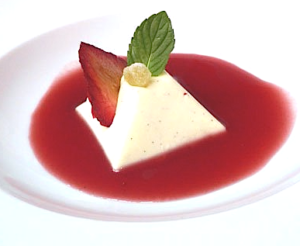“This cousin of the egg roll is my top choice for a light and healthy lunch. The rice paper at times is tricky yet once you have the technique down, I promise, you can not roll them fast enough so you can inhale them. No guilt….just pleasure. Also the perfect hors d’oeuvres.”
 Vietnamese Spring Rolls
Vietnamese Spring Rolls
Makes 16 rolls, to serve 6 to 8
Photo and recipe by Moshe Aeylon
Adapted from a recipe of Andrea Nguyen
Ingredients
- 1 teaspoon salt
- 24 small shrimp, peeled
- 1 boneless, thick pork loin chop or 1/3 pound boneless pork shoulder
- 1.3 pound dried round rice noodles (bun), cooked in boiling water for 3 to 5 minutes, drained, flushed with cold water, and drained again
- 1 head butter lettuce, leaves separated
- 12 to 16 sprigs cilantro
- 12 to 16 sprigs mint
- 32 to 48 Chinese chives (about ½ small bunch) optional
- 16 rice paper rounds, 8 ½ inches in diameter
- 1 /2 cups Spicy Hoisin-Garlic Sauce (I use MAE PLOY Sweet Chili Sauce)
Directions
- To poach the shrimp, fill a small saucepan
half full with water, add the salt, and bring to a rolling boil over
high heat. Add the shrimp, remove from the heat and let stand for 3 to
5 minutes, or until the shrimp have curled nicely and are pinkish
orange. Lift them out with a slotted spoon and set aside to cool. Leave
the water in the pan. - While the shrimp are poaching, trim any excess fat from the pork chop.
- Return
the water in the pan to a rolling boil and drop in the pork. When the
water starts bubbling at the edges of the pan, remove the pan from the
heat and cover tightly. Let stand for 20 minutes. The pork should be
firm yet still yield a bit to the touch. Remove the pork from the pan
and let cool. Save the light stock for another use or discard. - Working
with 1 shrimp at a time, lay it flat on a cutting board and cut in half
horizontally. (Use the index and middle fingers of your non-cutting
hand to keep the shrimp in place as you wield the knife.) Devein the
shrimp as necessary. Set aside on a plate. - Thinly slice the pork into strips about 1/8-inch thick, ½-inch wide, and 4 inches long. Add to the plate of shrimp.
Making the Spring Rolls
- Set
up a wrapping station composed of a flat work surface (a cutting board,
inverted baking sheet, or dish towel) and a bowl of water for dipping
the rice papers. Place the shrimp, pork, noodles, lettuce, and herbs
nearby. - Dip a rice paper round in water and then place it on your work surface.
- When
the rice paper is pliable and tacky, fold a lettuce leaf in half along
its central spine and then tear off the spine. Place the folded leaf on
the lower third of the rice paper round. - Put about 1/4 cup of the noodles on top of the lettuce, spreading them in a rectangle.
- Lay
a couple of pork strips on top (slightly overlapping, if necessary),
and then arrange a few mint and cilantro leaves on top of the pork,
spreading them out to distribute their flavors evenly. - Bring up the lower edge of the rice paper to cover the herbs.
- Roll up the rice paper so that the lettuce is now facing upward through the rice paper.
- Add 3 shrimp halves, cut side up, lining them up snugly end to end along the roll.
- Fold the sides of the circle inward to cover the filling.
- Roll one more full turn, so that the orange sides of the shrimp are now facing up.
- Tuck 2 or 3 Chines chives into the roll, letting them extend out one end.
- Continue to roll until you have a snug cylindrical package. The rice paper is self-sealing.
- Use a knife or scissors to trim the chives, leaving a 3/4 inch “tail” extending from the end.
- Repeat
this process to make 16 rolls in all, placing the finished rolls on a
serving platter. If the rolls seem too long to manage and eat
comfortably, cut them in half on the diagonal. - Serve the rolls with the sauce. Diners can dip the rolls into the sauce or spoon some sauce onto the rolls
Cooking Tips
- While the pork and shrimp may be poached a day ahead, slice them on the day you wrap.
- The noodles may be cooked early in the day, covered with plastic wrap, and kept at room temperature.
- You
may wrap the rolls 2 hours in advance of serving. Keep them covered
with plastic wrap to prevent the rice paper from drying out and
becoming unpleasantly tough. - If you are cutting the rolls, do so just before serving, or they may lose their nice shape.


